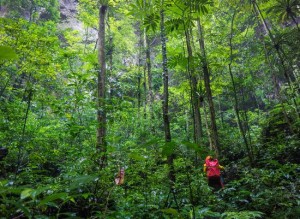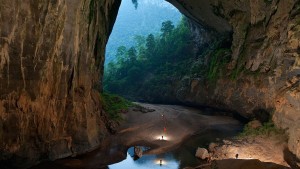Introduce Phong Nha-Ke Bang National Park
Introducing Phong Nha-Ke Bang National Park
Designated a Unesco World Heritage site in 2003, the remarkable Phong Nha-Ke Bang National Park contains the oldest karst mountains in Asia, formed approximately 400 million years ago. Riddled with hundreds of cave systems – many of extraordinary scale and length – and spectacular underground rivers, Phong Nha is a speleologists’ heaven on earth.

Its collection of stunning dry caves, terraced caves, towering stalagmites and glistening crystal-edged stalactites represent nature on a very grand scale indeed, and are beginning to create a real buzz in Vietnam, as more and more riches are discovered.
Serious exploration only began in the 1990s, lead by the British Cave Research Association and Hanoi University. Cavers first penetrated deep into Phong Nha Cave, one of the world’s longest systems. In 2005 Paradise Cave was discovered, and in 2009 a team found the world’s largest cave – Son Doong. Huge caverns and unknown cave networks are being discovered each year.

Above the ground, most of the mountainous 885 sq km of Photoing Nha-Ke Bang National Park is near-pristine tropical evergreen jungle, more than 90% of which is primary forest. It borders the biodiverse Hin Namno reserve in Laos to form an impressive, continuous slab of protected habitat. More than 100 types of mammal (including 10 species of primate, tigers, elephants, and the saola, a rare Asian antelope), 81 types of reptile and amphibian, and more than 300 varieties of bird have been logged in Phong Nha.
Until recently, access to the national park was very limited and strictly controlled by the Vietnamese military. Access is still quite tightly controlled for good reason (the park is still riddled with unexploded ordnance). Officially you are not allowed to hike here without a licensed tour operator.
You can however travel independently (on a motorbike or car) on the Ho Chi Minh Highway or Hwy 20 that cut through the park. Sights that can be visited include the astounding Paradise Cave, turquoise river, ecotrail of Nuoc Mooc and a war shrine known as Eight Lady cave.
The Phong Nha region is changing fast, with more and more accommodation options opening. Son Trach village (population 3000) is the main centre.
-
PHONG NHA HERITAGE TRAVEL
The Leading Local Tour Company

-
Contact Info
- Phong Nha Tourism Center, Son Trach Commune, Bo Trach dist, Quang Binh
- 02323 677 188
- +84 975 292 144
- heritagephongnha@gmail.com
- phongnhaheritagetravel.com
-
Useful Information
